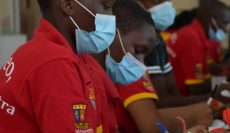|By Luz Edwards|
“Macheo” is a programme that helps with academic revision, character building and mentoring. It was created in 2012 in Nairobi. Of the 2019 students who finished secondary school in the programme, 50% scored well enough to enter university. The programme’s director says the secret is knowing how to involve teachers and families, and giving young people self-confidence.
The Macheo project, which has existed since 2012 at Strathmore University, takes its name from the Swahili word meaning “dawn” and seeks to enable high school students from the poorest neighborhoods of Nairobi to “illuminate” their lives. Its director, Luis Borrallo, is a Spaniard who has lived in Kenya for more than twenty years and who has worked intensely on the development of programmes for teachers from vulnerable sectors. In an interview with Revista Educar, he explains that “we created Macheo to give hope to these young people and support them with tools to which they have not had access, given where they come from. At the beginning, some of them find it hard to trust this programme and to trust themselves; but with time and as a relationship is formed with the teachers and mentors, they open up and begin to be protagonists of this process.”
How can you enlighten the lives of young people who live in harsh or impoverished contexts and motivate them to study?
The future of young people, and of all those who live in these neighborhoods, is quite difficult. There face the same problems as in other similar neighborhoods in cities around the world: high unemployment, crime, drugs, prostitution and a high percentage of teenage pregnancies. In their schools, there is often no running water and their families’ homes are usually a four-square meter room where the whole family sleeps.
What are the specific objectives of the programme?
That they finish high school, that their grades in school improve along with their interest in their education, and that 90 percent of the students continue their education after high school, going to university to pursue a degree or diploma.
What influences children to have a life plan or to give meaning to study?
In my opinion, this vision of the future and of life comes mainly from parents. I would call them “the values that parents pass on to their children”. In some cases, these values can also come from a teacher. We, in Macheo, also present them with this vision based on certain values such as honesty, hard work, effort, helping others, etc. Most of the young people we deal with do not have clear goals for their lives, or if they do, they are very superficial ones, like wanting to imitate a famous person. So, we try to convince them that with effort they can belong to this world that we show them and that they have never seen up close. “If you want to,” we tell them, “you belong to this world, but that depends above all on you and your effort.”
Thinking that many schools have few resources, how do you motivate children to stay in school?
I don’t know about Chilean schools, but ours not only have problems with methodology, but many lack classrooms and many other facilities, perhaps because we have a very young population, and we always need more schools than there are. So, the attitude of people here is to use what is available, even if it is broken or not working very well. If we waited for things to be right, we would never do anything. Our programme is based on reality as we find it and we do what we can to improve the situation.
THE SECRET OF SUCCESS
For Luis Borrallo, the key is not to put faith in infrastructure issues, but in the human aspect: to provide tools and resources for the students, parents and teachers, so that they can become aware of the bigger picture and their possibilities. This produces synergy and a positive attitude; a more harmonious environment where all the actors collaborate and feel they are protagonists. He lists three aspects that in his opinion are important:
– First, the education of the students’ character. The problem with young people is not a lack of intelligence, but rather sometimes an inferiority complex; perhaps because of lack of positive examples, families that have not been able to encourage reflection about their future lives, etc. In Macheo, we show them that their future can be good if they make an effort to improve, if they do not take the path of escapism, we encourage them to think about their context and circumstances, so that they themselves discover what keys to achieving change are.
-Second, parental involvement in the programme. Each year, three sessions are held for them at Strathmore University, where they are given a detailed explanation of what this programme in which their children participate is all about. These are parents who sometimes feel insecure about exercising authority because, in general, their level of schooling and culture is lower than that of their children. Here we tell them that, regardless of this, they are the main educators of their children and that the support, advice, and guidance they can give is essential for their children.
– Third, we work with the students’ schools. Macheo is a programme that takes place on Saturdays for young people who attend their own school during the week. These schools are supported in a variety of ways: with courses for the principals, doing an evaluation of the teachers’ needs and trying to help them when possible and looking for other possible areas in which we can help them. In this way, not only do the students who attend the programme benefit, but also those for whom there is no space.
THE GUIDING PRINCIPLES OF MACHEO
-The best way to address poverty in Kenya is to empower its people through education.
-The Macheo project is specifically designed to improve the retention rates of these underserved students in the education system.
-Many extraordinarily bright and capable young Kenyans underperform and do not even complete secondary education. In Kenya, only 3 percent of those who enroll in primary education go on to enroll at the university level.
-The Macheo project seeks to directly combat those barriers that systematically cause students to drop out or underachieve academically.
-Mentoring provides students not only with academic support, moral guidance and sound strategic advice, but also a clear sense that there are people who care about their well-being.
– During the pandemic, they had to make a great effort to visit the children attending Macheo one by one, so as not to lose contact with them.
Luis Borrallo, an educator, is a Spaniard who has lived in Kenya for more than twenty years and has worked extensively at Strathmore University developing programs for teachers in vulnerable sectors. He is currently the director of the Macheo project.






